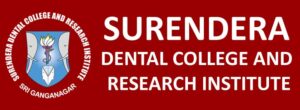A Candidate for admission to MDS course (Master of Dental Surgery) must have a recognized degree of BDS (Bachelor of Dental Surgery) awarded by an Indian University. One year Rotatory Internship must be completed. The candidate should be registered with any State Dental Council. The candidate should have qualified NEET MDS Examination conducted by Government of India. Admission will be made through Govt. of Rajasthan, NEET PG Medical & Dental Counseling Board.
Eligibility Criteria for NRI/ OCI/ PIO/ Foreign Nationals
- Candidate must posses a recognized graduate degree of Dentistry. Internship must be completed.
- He/She should be registered with a State Dental Council in India.
- Their Graduation Degree must be recognized by their Dental Council or concerned authority.
MDS courses of all the nine specialties are recognized by Govt. of India and Dental Council of India and affiliated to Rajasthan University of Health Sciences, Jaipur.
Duration: 3 Year Academic Program
CUT-OFF SCORES OF NEET MDS 2024 FOR VARIOUS CATEGORIES ARE AS FOLLOWS
| Category | Minimum Eligibility Criteria | Cut-off score (out of 960) |
| General Category (UR/EWS) | –Percentile | — |
| SC/ST/OBC (Including PWD of SC/ST/OBC) | –Percentile | — |
Individual score card of the candidates who appeared NEET-MDS can be downloaded from the website https://nbe.edu.in The cut-off score will be reviewed, as per Dental Council of India, Master of Dental Surgery Course (1st Amendment) Regulations, 2018 once the exact number of category-wise vacancies are made available to NBE by Dental Council of India
SPECIALITIES RECOGNIZED FOR M.D.S. COURSE
Prosthodontics and Crown & Bridge and Oral Implantology is that branch of Dental art and science pertaining to the restoration and maintenance of oral function, health, comfort and appearance by the replacement of mission or lost natural teeth and associated tissues either by a fixed and removable artificial substitute.
Periodontology and Oral Implantology is the science dealing with the health and diseases of the investing and supporting structures of the teeth and oral mucous membrane.
Oral & Maxillofacial surgery and implantology deals with the diagnosis and surgical and adjunctive treatment of diseases, injuries and defects of the human jaws and associated oral and facial structures.
Conservative dentistry deals with prevention and treatment of the diseases and injuries of the hard tissues and the pulp of the tooth and associated periapical lesions.
Orthodontics and dentofacial orthopedics deals with prevention and correction of oral anomalies and malocclusion and the harmonizing of the structures involved so that the dental mechanisms will function in a normal way.
Oral Pathology deals with the nature of oral diseases, their causes, processes, and effects. It relates to the clinical manifestation of oral diseases to the physiologic and anatomic changes associated with these diseases.
Paedontics and preventive dentistry deals with prevention and treatment of oral and dental ailments that may occur during childhood.
Community Dentistry is the science and art of preventing and controlling Dental diseases and promoting Dental Oral health through organized community efforts.
Oral Medicine is that specialty of dentistry concerned with the basic diagnostic procedures and techniques useful in recognizing the diseases of the oral tissues of local and constitutional origin and their medical management. Radiology is a science dealing with x-rays and their uses in the diagnosis and treatment of diseases in relation to orofacial diseases.
Course Highlights
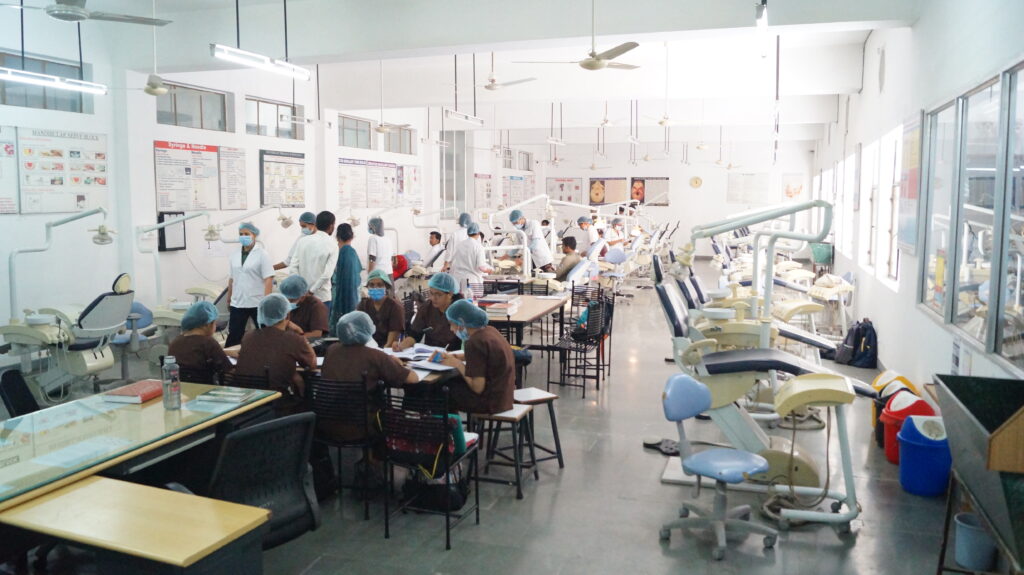
Dissection and Lab work
During the first and second year of the course the students learn about human body, its physiology, biochemical aspects and dental materials. Anatomy dissection performed in details in the dissection theater form an integral and important part of first year of BDS acquainting them with the human body. Students learn the basics of biochemistry, physiology , pathology, microbiology in well furnished labs. This prepares them to conduct and interpret tests and test reports.
Pre-clinical work
The students start their foundation for clinical work by doing pre-clinical work on models and simulation labs which begins in 1st BDS and continues through 2nd and 3rd BDS. The pre-clinical exercised are designed to develop dexterity and apply the clinical principles on human simulation models before actually performing the procedures on patients.
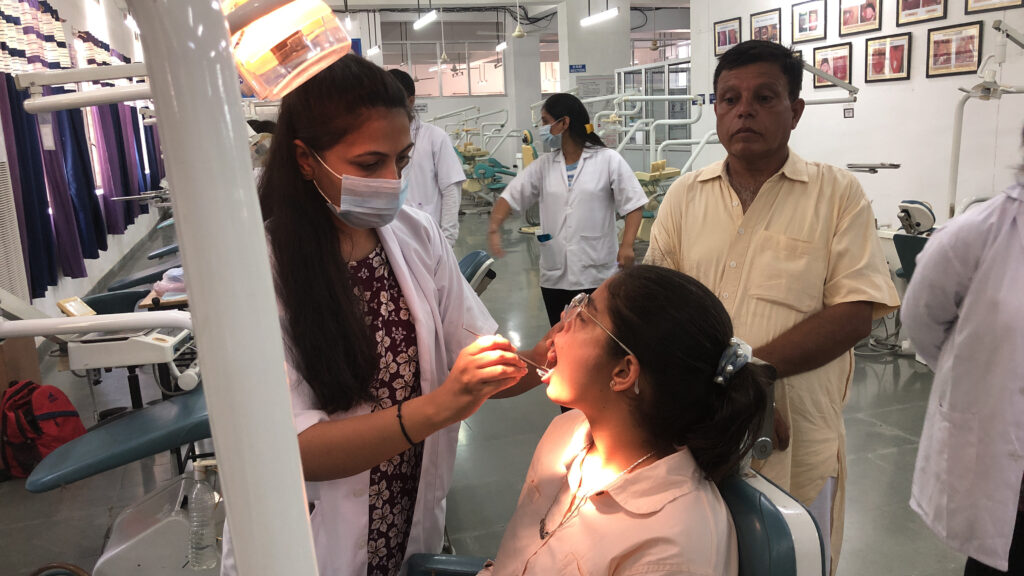
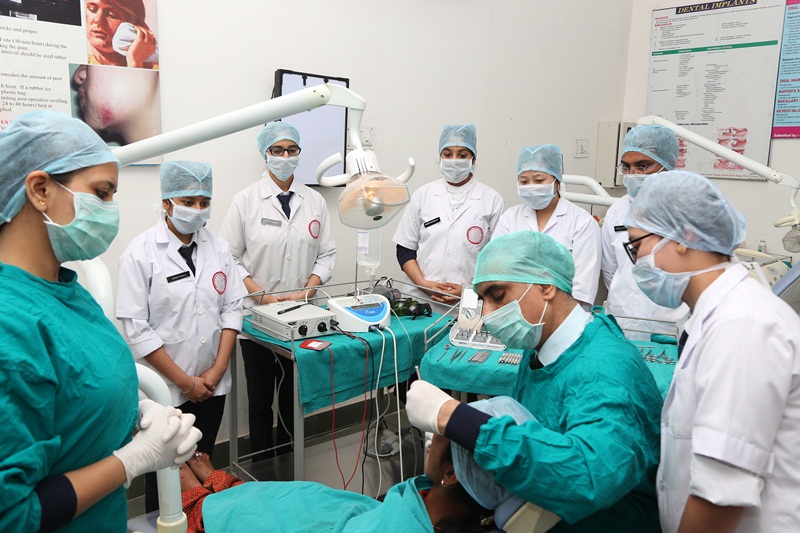
Clinical observership
Once the students are through their pre-clinical work, they observe various procedures performed by the faculty. During this, they also learn various aspects of clinical treatment and patient management. They also participate in diagnosis and treatment planning for specific patients in all the departments.
Seminars / Conferences / Workshops
Gaining expertise in a particular topic, literature reviewing and public speaking skills are honed by way of seminar presentation throughout the course. As doctors,these skills are essential for a rewarding professional career
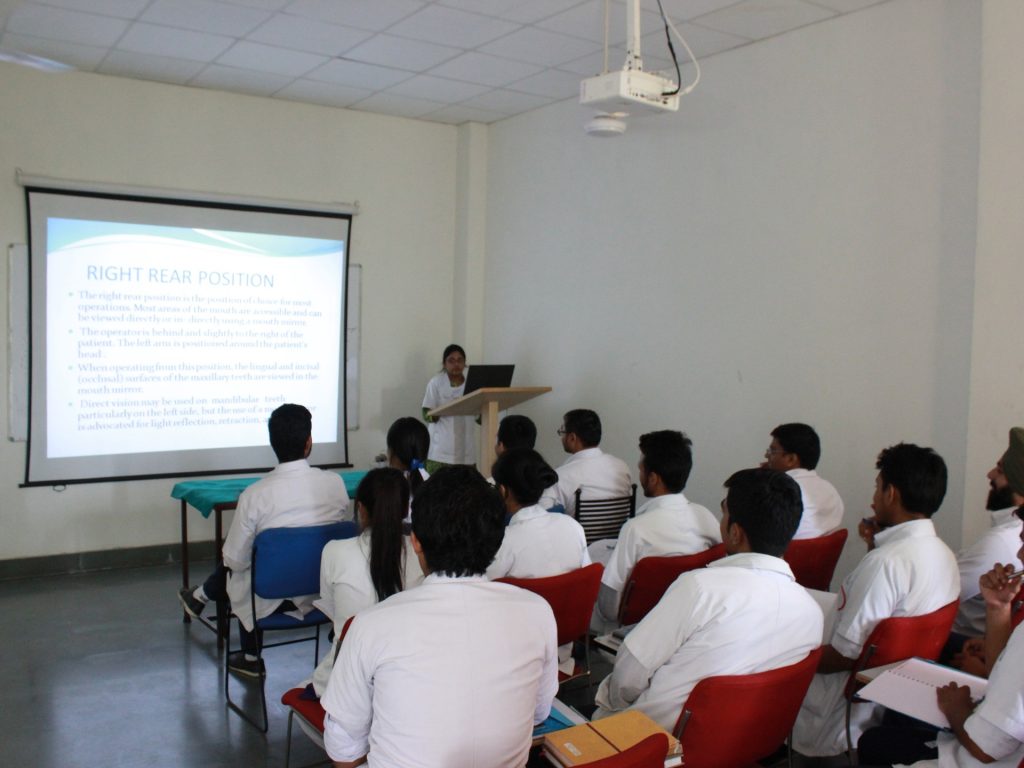
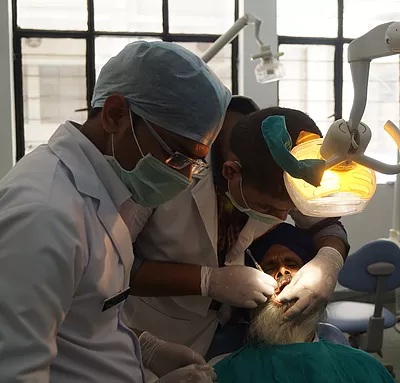
Clinical work
Graduates begin handling patients, first by assisting the faculty while performing the procedures, followed by independently handling a wide array of patients in all the departments. In addition to performing clinical procedures, students also handle clinical workups of patients, OPD and post-operative care.
